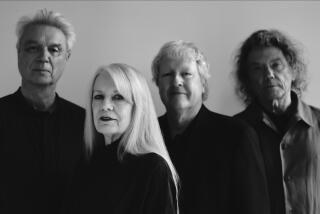O.C. POP MUSIC REVIEW : An Evening of Pleasant Byrd Songs : Appearing at the Coach House, Roger McGuinn lovingly re-creates the sound he forged with the group during the ‘60s and early ‘70s. The performance suggests that there is such a thing as enduring quality.
SAN JUAN CAPISTRANO — Critics are always hailing music that seeks to prod, challenge, confront and surprise. Well, here’s a big hurrah for an evening with Roger McGuinn that took us away from the tumult of the new and spoke with a welcome voice of constancy and reassurance.
A comeback artist at 48, the definitive Byrd isn’t posing as a guiding rudder or forward-pushing propeller for rock in the ‘90s. But McGuinn’s gleaming show Friday night at the Coach House reminded us that our musical ship of state also requires a solid, well-made anchor.
Backed by the Headlights, a skillful Tampa band whose four members looked younger than 95% of the Boomer-packed house, McGuinn played old Byrds songs and new Byrds songs (that is, the friendly, feathered sound of “Back From Rio,” his first album in a decade) without a hint of innovation or re-evaluation.
Unhip? Maybe, given a rock ethic that promotes constant change (and leads to such developments as Dylan’s messy stage mutilations of his canon and Bowie’s purported burial of his catalogue in a velvet-lined box). But McGuinn’s committed, lovingly rendered re-creation of the sound he forged with the Byrds during the ‘60s and early ‘70s suggested that there is such a thing as enduring quality, and that works which possess it can be left to stand without apologies.
Enduring themes help. Those rich harmonies and that glistening guitar sound certainly might have made some in the audience feel nostalgic, but alienation and self-examination figure prominently in the oldies that McGuinn played, and in his new songs as well. The impulse toward nostalgia is based on a wish that life might seem clear-cut and simple. There was nothing pat or settled about hits like the Dylan-penned “My Back Pages” and “Eight Miles High,” even if they were played to sound just like the original Byrds recordings.
Tension between anxiety and reassurance is a foundation of the Byrds’ music, and that duality keeps it fascinating without any need for updating or alteration. McGuinn’s voice, full of the “high lonesome sound” he sings about in “King of the Hill,” is the reedy, trembling voice of a man reaching for something to hold on to in a precarious world. The other key elements--sweet harmonies, chiming guitars that strike at something ingrained in us from the first sound of cradle bells and baby rattles--signal that there is succor, even for the high and lonesome.
McGuinn’s Rickenbacker 12-string certainly rang responsively. So did the dissonant, trans-galactic telegraphy of his extended solo during “Eight Miles High.”
Two of the “Back From Rio” songs played at the outset didn’t lean to McGuinn’s strong suits. Always best when singing fervently, or with dry humor, McGuinn didn’t muster the acerbic edge to put across the attempted social satire of “Car Phone” or the bile of the Elvis Costello-penned put-down song, “You Bowed Down.” The spoken narrative of “Chestnut Mare” seemed strained and rehearsed, lacking in the warm, campfire-story glow of the original telling.
Otherwise, McGuinn and his unheralded but admirable backing players (who were also adept harmony singers) did it all justice. Steve Connelly, the Headlights’ lead guitarist, was a striking, showy-but-expert player who recalled the playing style and stage moves of Pete Townshend and Nils Lofgren. His driven solo flurries helped fan “Lover of the Bayou” into a darkly raging highlight.
Connelly’s rambunctious presence (at one point he shook his guitar back and forth, looking more as if he were trying to land a giant marlin than wrench out a solo) were a helpful counterpoint to McGuinn’s characteristic reserve. He gave brief song introductions and reached out mainly with the sort of sincere but nervous smile a novice clergyman might wear in a get-acquainted meeting with his first congregants. Of course, the congregation could easily forgive a lack of social ease in one so attuned to the rock of ages.
McGuinn ends his run of four Southern California concerts tonight at Spreckels Theatre in San Diego.
More to Read
The biggest entertainment stories
Get our big stories about Hollywood, film, television, music, arts, culture and more right in your inbox as soon as they publish.
You may occasionally receive promotional content from the Los Angeles Times.









